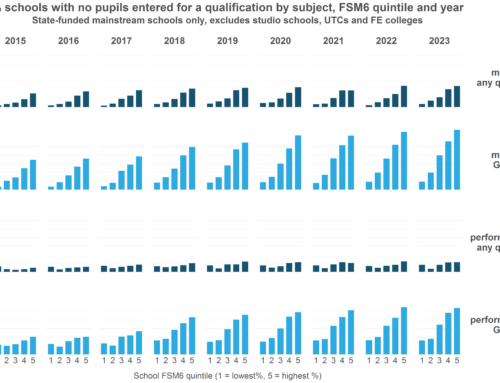Since our launch eight months ago, Education Datalab has completed research on school admissions and selection, teacher careers, pupil premium gaps and individual pupil attainment trajectories. But we have written more about secondary school accountability than any other topic. This is, perhaps, not surprising, given the enormous changes in the qualification and accountability regimes currently taking place.
We have already looked at the winners and losers under Progress 8 and GCSE re-scaling, the proposed definition of coasting schools and more fundamental questions of whether it is ever possible to compare schools with very different intakes. And in this report we show how schools are re-aligning their Key Stage 4 to accommodate the EBacc and imminent introduction of Progress 8.
In our analysis, we regularly reflect on the unintended consequences of the accountability system on the children it is supposed to serve. During visits to schools and local authorities over the past six months we became increasingly concerned about disadvantaged and vulnerable children who need to make secondary school moves at non-standard times. In this report we propose a modification to the way that pupils are counted in performance tables to encourage schools to take these children on, even if they are close to reaching GCSE examinations.
In our final piece, we explore whether the rise of ever more sophisticated data-led performance monitoring allows us to re-imagine the role of Ofsted in school improvement.
Given that we are part of FFT, it is perhaps no surprise that the analysis we conduct is high-level and data driven. And yet we generate most of our ideas for research by talking to teachers, local authorities, academy trusts and others involved in running schools. So, if you have ideas for research or questions about our analysis then please do get in touch. We would love to join your conversation about creating the education system our children deserve.





Leave A Comment